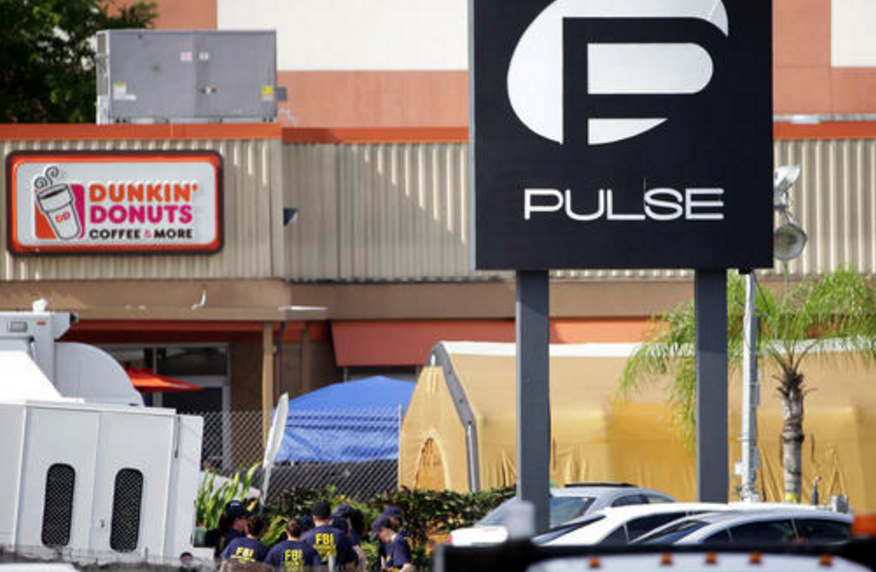
ORLANDO, Fla. – Investigators from the FBI peered deeper Tuesday into the life of the Orlando nightclub gunman, even as the bureau faced questions and an internal reckoning over whether it missed warnings signs during a 10-month probe of the shooter that ended two years before the shooting.
While the probe widened to include the FBI’s prior contacts with the gunman – including why the earlier investigation, which placed the shooter on a terrorism watch list, was effectively closed – emerging details about his background raised new questions about the deadliest mass shooting in U.S. history.
The gunman – identified by authorities as Omar Mateen – had previously visited Pulse, the gay nightclub where 49 people were killed and dozens injured in the worst mass shooting in American history.
At least two witnesses said that they had seen Mateen there before, and also siad they had seen him on Jack’d, a dating app for men. Mateen was killed in a firefight with police after the shooting at Pulse and a hostage standoff that followed.
In Orlando, the toll of the shooting was still being determined – and a surgeon at the hospital treating most victims said the number of people killed could still rise.
Hospital officials said Tuesday that six of the people injured in the shooting rampage were still critically ill, while another five were in “guarded” condition. All told, 27 of the 44 patients brought to Orlando Regional Medical Center after the shooting remained hospitalized, said Michael L. Cheatham, the chief surgical quality officer at the facility.
As hospital workers still worked to treat the injured, the sprawling investigation into the rampage will also look back at two other times Mateen was on the FBI’s radar.
FBI Director James B. Comey said the bureau will “look at our own work, to see if there is something we should have done differently” during its earlier contacts with Mateen. “So far, I think the honest answer is: I don’t think so,” Comey added. “We will continue to look forward in this investigation and backward.”
The FBI investigated Mateen beginning in 2013, putting him under surveillance, recording his calls and using confidential informants to gauge whether he had been radicalized after the suspect talked at work about his connections with al-Qaeda and dying as a martyr.
It was during this probe, which ended in 2014, that Mateen was placed on a terrorism watch list. Comey, speaking to reporters at the Justice Department, declined to say whether he was also placed on a no-fly list. After the shooting, Congress again began debating whether to prevent people on such lists from buying guns.
After the FBI closed its preliminary investigation into Mateen in 2014, his name emerged months later in a separate probe, this one looking into a Florida man who became the first American suicide bomber in Syria. Investigators said they did not find any significant ties between the two men – who attended the same mosque in Fort Pierce, Fla. – and moved on.
It was the third time in recent years that someone scrutinized by the FBI later carried out an attack, following the Boston Marathon bombing in 2013 and a planned attack last year on a contest to draw the prophet Muhammad.
The investigation into the Orlando shooting is delving into a thorny series of factors. While the gunman pledged allegiance to the Islamic State during during his standoff with police Sunday, during this call and years earlier he referenced rival extremist groups, leaving his precise sympathies unknown, Comey said.
President Barack Obama said that the shooting appeared so far to be a case of “homegrown extremism.” During remarks made in the Oval Office, Obama said there was “no clear evidence that [the gunman] was directed externally” or “part of a larger plot.”
The attacker targeted a gay club, so Comey said the investigators were working to see what role anti-gay bigotry may have played. Comey’s remarks were made before witnesses told reporters they had seen the gunman on gay dating apps, which may add another dimension to the attack. And the shooting occurred during the club’s “Latin Night,” carving deep, painful wounds into the heart of Orlando’s Latino community.
Comey said Monday that investigators were “highly confident that this killer was radicalized, and at least in some part through the Internet,” though he said they were still trying to determine his motives and possible sources of inspiration.
The shooting appeared to exist at a grim nexus of horror, connecting the lone attackers – usually young men like Mateen – who carry out shooting rampages with the ongoing challenge of trying to isolate potential threats who may be inspired by the Islamic State or other extremist groups. Late Monday, an allegedly Islamic State-inspired attacker fatally stabbed a police captain and a government official at the couple’s home outside Paris.
Florida Gov. Rick Scott (R), speaking near the scene of the slayings, said Tuesday that investigators were working diligently to sort out what happened in Orlando and why. He said he had been focused on talking to victims’ family members and did not offer any new details on the status of the investigation.
Scott also called for the federal government to share more information with its state counterparts in the wake of the shooting. While he did not specify how more sharing of information might have prevented the massacre, Scott said it was broadly important that federal officials share what they learn with local law enforcement – especially in immigration or refugee cases.
He referred to terrorist attacks in Paris in November that killed 130 people, saying that he told the federal government afterward, “Look, until you can tell me how you’re going to vet people, don’t send refugees into my state.”

